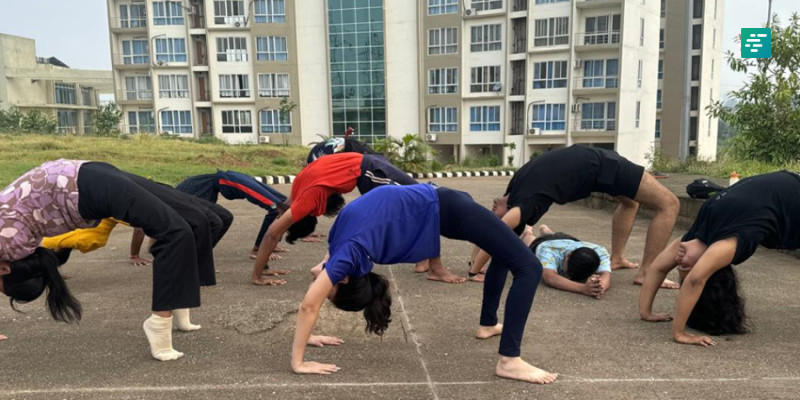
The life of a student is often a whirlwind of lectures, assignments, and social obligations. Amidst this academic chaos, physical health and exercise can sometimes take a backseat. However, it's crucial for students to recognize the numerous advantages that regular exercise offers, not only for their physical well-being but also for their academic and mental health. In this article, we will delve into the multifaceted benefits of incorporating regular exercise into a student's routine.
Physical Health Benefits
1. Maintaining a Healthy Weight: One of the most apparent benefits of regular exercise is weight management. College life can lead to unhealthy eating habits and a sedentary lifestyle, making weight gain a common concern. Exercise helps burn calories, maintain a healthy weight, and reduce the risk of obesity-related health issues.
2. Boosting Cardiovascular Health: Engaging in aerobic activities like running, swimming, or cycling improves cardiovascular health. It strengthens the heart, lowers blood pressure, and reduces the risk of heart diseases, which can be particularly beneficial for students dealing with academic stress.
3. Strengthening Muscles and Bones: Weight-bearing exercises like strength training promote muscle growth and strengthen bones. This is particularly important for young adults in their bone-forming years, reducing the risk of osteoporosis later in life.
4. Enhancing Immune Function: Regular physical activity can boost the immune system, making students less susceptible to illnesses. This can be especially advantageous in crowded dormitories and classrooms where germs can easily spread.
Mental Health Benefits
1. Reducing Stress and Anxiety: College life often brings high levels of stress and anxiety. Exercise triggers the release of endorphins, which are natural mood lifters. This can help students manage stress and anxiety, promoting a more relaxed and focused mindset.
2. Improving Sleep: Many students struggle with irregular sleep patterns. Exercise can help regulate sleep by promoting a deeper and more restful night's rest. Adequate sleep is essential for cognitive function and overall well-being.
3. Enhancing Cognitive Function: Regular exercise has been linked to improved cognitive function. It enhances memory, concentration, and problem-solving abilities, making it easier for students to excel in their studies.
4. Boosting Self-Esteem: Physical activity can improve self-esteem and body image. College can be a time of self-discovery, and exercise can help students feel more confident and comfortable in their own skin.
Academic Benefits
1. Increased Focus and Productivity: Exercise increases blood flow to the brain, which enhances cognitive function. Students who exercise regularly often experience improved focus, concentration, and productivity in their studies.
2. Better Time Management: Incorporating exercise into one's daily routine can teach valuable time management skills. Students who make time for exercise tend to become more organized and efficient in managing their schedules.
3. Stress Management: Academic pressure can lead to stress, which can hinder performance. Regular exercise is an effective stress management tool, helping students stay calm under pressure and perform better in exams and assignments.
4. Improved Problem-Solving Skills: Exercise encourages creative thinking and problem-solving. Many students report that they have their best ideas while engaged in physical activity, making it a useful tool for tackling complex academic challenges.
Social and Emotional Benefits
1. Building Social Connections: Joining sports teams, fitness classes, or recreational leagues can help students make new friends and build a supportive social network. These connections contribute to emotional well-being and provide a sense of belonging.
2. Enhancing Self-Discipline: Committing to a regular exercise routine cultivates self-discipline and dedication. These qualities are not only valuable in fitness but also in academic and professional pursuits.
3. Boosting Confidence: Achieving fitness goals and milestones can boost self-confidence. As students see progress in their physical abilities, they often carry this newfound confidence into other areas of their lives, including their studies.
Practical Tips for Incorporating Exercise into a Student's Routine
1. Set Realistic Goals: Start with achievable fitness goals and gradually increase intensity and duration as your fitness level improves.
2. Create a Schedule: Treat exercise like an essential part of your day. Block out time for workouts in your schedule to ensure consistency.
3. Choose Activities You Enjoy: Whether it's dancing, hiking, swimming, or playing team sports, select activities that you genuinely enjoy to make exercise a more enjoyable experience.
4. Stay Accountable: Find a workout buddy or join group fitness classes to stay motivated and accountable.
5. Utilize Campus Facilities: Most college campuses offer fitness centers, recreational facilities, and sports clubs. Take advantage of these resources.
Regular exercise is a powerful tool that can significantly enhance a student's overall well-being. It offers physical health benefits, including weight management and improved cardiovascular health. Moreover, exercise contributes to mental health by reducing stress, enhancing sleep, and boosting cognitive function. The academic advantages, such as increased focus and stress management, make exercise an indispensable part of a student's routine. By recognizing the multitude of benefits that exercise brings, students can prioritize their physical and mental health while pursuing their academic goals. Whether it's a daily jog, a yoga class, or a team sport, incorporating regular exercise into one's routine is an investment in a healthier and more successful college experience!